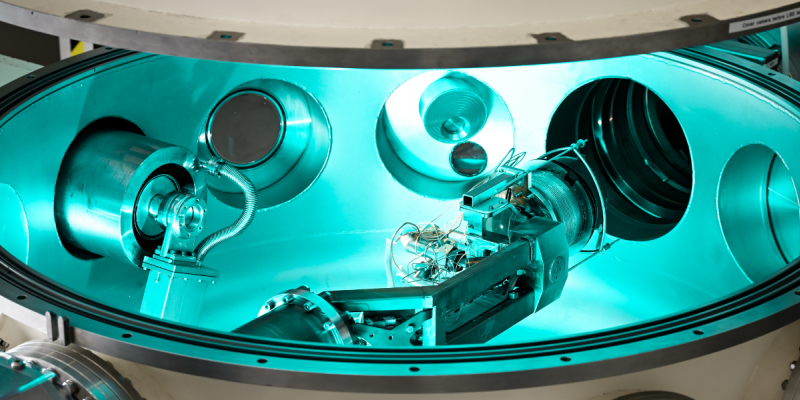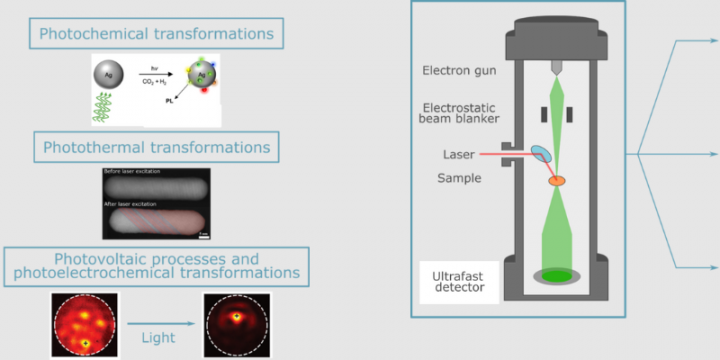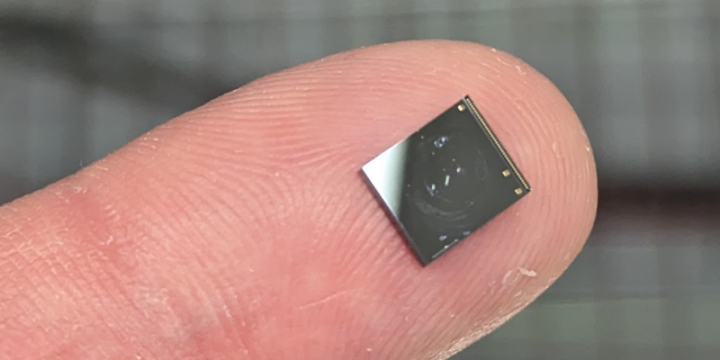Advanced instrumentation brings together many state-of-the-art technologies and different disciplines for the design of complex systems, often for concrete applications, such as in scientific research, for industrial production, or in high-quality medical technology.
This programme focuses on advanced instrumentation within four themes:
- ultra-sensitive detectors
- high-performance optics
- resistant instrumentation for extreme conditions
- complex system integration.
The consortium aims to achieve more intensive collaboration between knowledge institutions and companies, giving the Dutch high-tech sector access to innovative technologies.
Programme duration: 4 years | 2024 - 2027
Problem statement
The Dutch manufacturing industry for research instruments is internationally distinctive and contributes significantly to the economic growth of the high-tech sector. The knowledge institutes involved have a leading position through the development of innovative and unique instrumentation, for which collaboration with industry is essential. This strategic programme focuses on both the front-end and back-end components of instrumentation, with a specific focus on aspects that influence the perception and/or image quality of the instrument. Within the front-end, the emphasis is on advanced optical systems and the development of new ultra-sensitive detectors with increased and specialized sensitivity, while the back-end is focused on fast and (energy) efficient processing and interpretation of signals.
Research instrumentation often must withstand extreme conditions, such as ultra-high vacuum environments, biologically sterile environments and extreme temperatures such as those encountered in hot plasma or cryogenic applications. Creating extreme conditions and instruments that can withstand them, and developing specific subsystems such as an advanced source within an instrument, are also an important focus within this programe. This also makes complex system integration an essential aspect of the Advanced Instrumentation strategic programme.
Objective
Through this strategic programme we want to give the Dutch high-tech industry more access to knowledge within institutes and knowledge institutions. With this we want to create a hotspot of innovation to give Dutch high-tech companies unique advantages. Knowledge institutions are currently building up a lot of knowledge through their role within international large-scale scientific infrastructures. Such infrastructures offer considerable potential for innovation and knowledge exchange with the business community, but this is not yet sufficiently accessible to smaller companies. This strategic programme attempts to increase the number of connections between knowledge institutions and companies that operate in the field of advanced instruments by entering into more public-private partnerships.
Approach
This strategic programme strengthens both the Dutch knowledge infrastructure and the knowledge position of the Netherlands at an international level. Close collaboration with the business community also improves the valorization possibilities of the knowledge institutions involved. Through public-private partnerships, fundamental knowledge will not only be gained, but this knowledge will be able to be translated into the development of new products, equipment and processes through the efforts of Dutch companies. Projects carried out within this strategic programme can lead to more application-oriented follow-up research at universities of applied sciences and industry.
Relation with urgent transitions, KIAs and technologies
Urgent transitions
- Key Enabling Technologies: the Advanced Instrumentation strategic programme fits well with several main categories of key enabling technologies (Advanced Materials; Photonics and Optical Technologies; Digital and Information Technologies; Engineering and Fabrication Technologies)
- Energy transition: within this strategic programe a number of projects will be carried out in which technologies are developed for instrumentation for nuclear fusion and plasma diagnostics. We also expect projects for the development of technologies for solar fuels, for example instruments for material selection, the production of green hydrogen, or synthetic fuels.
- Digitalisation (Artificial Intelligence; Data Science, Data Analytics and Data Spaces).
Knowledge and Innovation Agendas
- KIA Maatschappelijk Verdienvermogen (social earning capacity): breakthroughs in components or (sub)systems often have a broader application. Investing in Big Science technologies has a proven effect on social earning capacity (Tjong Tjin Tai, S.Y., J. van den Broek and J. Deuten (2019). The impact of large-scale research infrastructures – A measurement method for the return on investment of international research facilities. The Hague: Rathenau Institute). In addition, research infrastructure drives high-quality technological developments, which will be applied years later in the high-tech industry.
- KIA Klimaat en Energie (energy transition and sustainability): within this strategic program, we want to use PPP projects to develop instruments to validate scientific ideas that will be applied to a future power plant, such as fusion. In addition, we focus on instrumentation to manufacture and analyze materials for energy generation, energy conversion, synthetic fuels and energy storage.
- Other KIAs: Although this strategic programme is strongly focused on "social earning capacity" and several projects are expected to connect to the KIA "energy transition and sustainability", it is plausible that some projects also connect to one of the other KIAs. For example, instruments for material analysis will also be used for waste separation during further development, thus contributing to a “circular economy”. Advanced optics can find broader applications in ground-based astronomy and can also be used by Defense, thus contributing to “security”.
Technologies
Advanced Instrumentation connects scientific research, applied research and product development to strengthen the Dutch innovative power and competitive position. With this we want to encourage private companies and public researchers to work together at an early stage of technological development (low Technology Readiness Level, TRL) and thus sharpen the focus of scientific research, jointly identify R&D priorities for the Netherlands, reduce risks and improve the quality and efficiency of current and new production processes. In concrete terms, this strategic programme focuses on opportunities for Dutch companies to co-develop and produce (scientific) advanced instrumentation, whereby guaranteeing high quality standards of Dutch output is a requirement.
Various technologies are essential for projects within this strategic programme, such as systems engineering, electronics and photonics. For example, the systems engineering roadmap focuses on improving and refining (new) processes for system integration. Such processes are applied in this strategic programme for innovation within developments, instruments and technologies. The Advanced Instrumentation roadmap typically focuses on lower TRL developments. Successful technologies and instruments that are widely supported often find common ground with other roadmaps, such as high-tech materials, semiconductor manufacturing equipment, space and smart industry. With further development, innovations for specific industrial and/or social applications can be implemented.

The main research facility in the DIFFER PSI-lab is Magnum-PSI, the world’s most powerful linear plasma generator. This machine can simulate the conditions to which critical parts in future fusion reactors are exposed. A cascaded arc plasma source produces a hot, dense plasma which is guided to the target by a superconducting magnet. A multitude of diagnostics is employed to analyze the plasma and the wall material during and after exposure. Researchers from all over the world come to Magnum-PSI to study plasma-wall interactions during and after long-term exposure.
Urgent transitions
Key enabling technologies
Energy transition
Digitalisation & Smart Industry
Knowledge and Innovation Agendas (KIAs)
KIA Key Enabling Technologies
KIA Klimaat en Energie
KIA Maatschappelijk
Verdienvermogen
Programmes and projects
Holland High Tech supports programmes and projects in the sector High Tech Systems and Materials. Carried out in close collaboration between public and private partners within the mission-driven and innovation policy. Here is an overview funded R&D programmes and projects by Holland High Tech.




